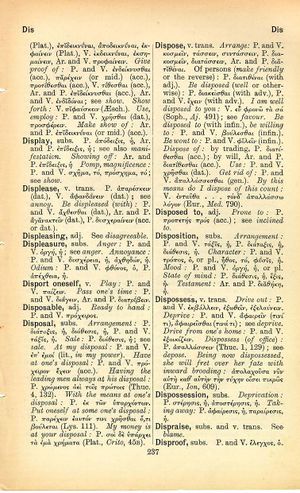displease: Difference between revisions
From LSJ
κατ' ἀρχῆς γὰρ φιλαίτιος λεώς → people are always ready to blame the rulers, people are against authority, people were fond of anything by which they could call authority in question
(CSV3) |
m (Woodhouse1 replacement) |
||
| Line 1: | Line 1: | ||
{{Woodhouse1 | {{Woodhouse1 | ||
|Text=[[File:woodhouse_237.jpg|thumb|link={{filepath:woodhouse_237.jpg}}]] | |Text=[[File:woodhouse_237.jpg|thumb|link={{filepath:woodhouse_237.jpg}}]] | ||
===verb transitive=== | |||
P. ἀπαρέσκειν (dat.), V. ἀφανδάνειν (dat.); see [[annoy]]. | [[prose|P.]] [[ἀπαρέσκειν]] (dat.), [[verse|V.]] [[ἀφανδάνειν]] (dat.); see [[annoy]]. | ||
[[be displeased]] ([[with]]): [[prose|P.]] and [[verse|V.]] [[ἄχθεσθαι]] (dat.), [[Aristophanes|Ar.]] and [[prose|P.]] [[ἀγανακτεῖν]] (dat.), [[prose|P.]] [[δυσχεραίνειν]] (acc. or dat.). | |||
}} | }} | ||
Revision as of 08:56, 20 May 2020
English > Greek (Woodhouse)
verb transitive
P. ἀπαρέσκειν (dat.), V. ἀφανδάνειν (dat.); see annoy.
be displeased (with): P. and V. ἄχθεσθαι (dat.), Ar. and P. ἀγανακτεῖν (dat.), P. δυσχεραίνειν (acc. or dat.).

